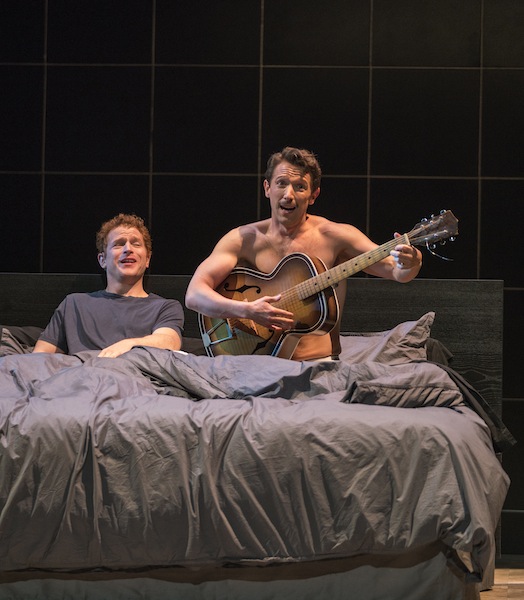City Opera wraps pivotal season with probing “Angels in America”

Andrew Garland and Aaron Blake in Peter Eötvös’s “Angels in America” at New York City Opera. Photo: Sara Shatz
It was one thing for the reconstituted New York City Opera to pull off a single comeback season. Now at the conclusion of a second year of robust programming, it’s hard not to take the revival seriously, especially ending as it did with so powerful a final production.
On Saturday night at Jazz at Lincoln Center’s Rose Theater, NYCO offered Peter Eötvös’s operatic adaptation of Tony Kushner’s pivotal two-part play Angels in America. An energetic libretto by Mari Mezei effectively distills Kushner’s seven-hour marathon into two acts running about two-and-a-half hours, with most of the dramatic structure still intact.
Set during the height of the AIDS epidemic in 1980s New York, Angels follows a large ensemble cast of characters affected by the disease, but centers primarily on the relationship between Prior Walter and Louis Ironson. Prior’s life seems impossibly bleak when, having been diagnosed with AIDS and hospitalized, Louis abandons him, yet thanks to (possibly imagined) divine intervention, he finds meaning in his life, ultimately through activism. The dark foil to Prior’s story is the subplot centering around Roy Cohn, the infamous McCarthyite political fixer who insisted to his dying day that it was liver cancer, not AIDS, that was killing him. Early on we see him bragging about jury fixing and bribery to unassuming Mormon lawyer Joseph Pitt, whose tidy marriage to Harper is about to unravel when she finally confronts him about his sexuality.
Given the weight of its subject, one of the easiest things to forget about Angels is just how wickedly funny it is. Even in moments of tremendous pathos, Kushner’s story is able to find blistering humor, a sense that is reflected in Eötvös’s score–one particularly memorable example is from Roy Cohn’s antagonistic phone conversation with a client, whose contributions on the other end of the line are supplied by an incontinent, turkey-like gurgling from one of three choristers in the pit.
Eötvös’s music often struggles to find its way out of a murky, sour tonality, and yet there is remarkable variation in his work; his gift for musical representation comes through primarily in the ever-shifting textures of the score. Eötvös is constantly inventive, finding unusual yet suggestive ways of expressing the characters’ inner thoughts, whether through sighing sul ponticello playing or through agitated doubling of chorister lines. Harper’s Valium-induced hallucination was particularly evocative, using glassy textures and eerie, wandering lines to create a psychedelic auditory experience. Conductor Christian Mazzagatti and the NYCO orchestra were brilliant, giving a clear-eyed reading of a work in which the nuances can be difficult to parse out.
The relatively intimate setting allows the audience an up-close glimpse of the terrific work of the actors NYCO has assembled for this New York premiere. There was aching depth to Aaron Blake’s interpretation of Louis, who combined a bright, creamy tenor and vocal intensity to give the finest singing of the night. A magnetic actor, he crafted a vividly human portrait of the character as he struggled with whether he could support the man he loved during his illness. No less compelling was the chestnut-voiced baritone Andrew Garland as Prior, called upon to give the most emotionally taxing performance of the cast and serve as the drama’s moral center.
Wayne Tigges made for an unabashedly sleazy Roy Cohn, the unscrupulous lawyer and political operator. Laid low by AIDS himself, he is the foil who shows us that bad things happen to bad people, too, yet there is something truly pitiable in his relentless, sociopathic nihilism. Kirsten Chambers sported a soprano of blinding power and searing brightness as the angel, a cigarette-smoking, blazing beacon of celestial sensuality. Sarah Beckham-Turner was a little too harsh as Harper Pitt, but marvelous as the sultry-voiced, smugly vindictive ghost of Ethel Rosenberg, come back to haunt Cohn in his hospital bed.
Countertenor Matthew Reese sparkled in the various roles of the fast-selling figment Mr. Lies, the no-nonsense night nurse Belize, and the homeless woman in the Bronx. Michael Weyandt channeled deep pathos as Joseph Pitt, struggling to reconcile his sexuality with the religious values that have guided his entire life. Sarah Castle showed her versatility in the roles of Hannah Pitt, the comic Rabbi Chemelwitz, and Cohn’s dutiful doctor, Henry.
The sets created by John Farrell for Sam Helfrich’s production were a little drab, sleek enough, but offering just the barest minimum to establish each scene in the fast-moving drama. Much more effective is the brilliant lighting by Derek Van Heel, making the offstage proclamations of the angel seem truly heavenly with an otherworldly wash of white light streaming through the window. Helfrich isn’t shy about much in this staging–there’s certainly more nudity in this realization than most American operagoers will be used to–but what truly holds the presentation together is the beautiful dramatic performances that he coaxes out of his actors.
It’s always difficult to present a dramatic piece that’s tied to an issue of its time and the surrounding sentiments. Indeed, the opera’s closing testimony, that the world spins only, inexorably forward, will likely ring hollow to many New York audience members in this political moment. Yet on the whole, Angels ages remarkably well–more than a message play about a specific event, it feels like a work that uses its contemporary concerns to reach at universal truths about love, grief, and resilience.
Angels in America will be repeated on June 12, June 14, and June 16 at 7:30 PM at the Rose Theater. nycopera.com







